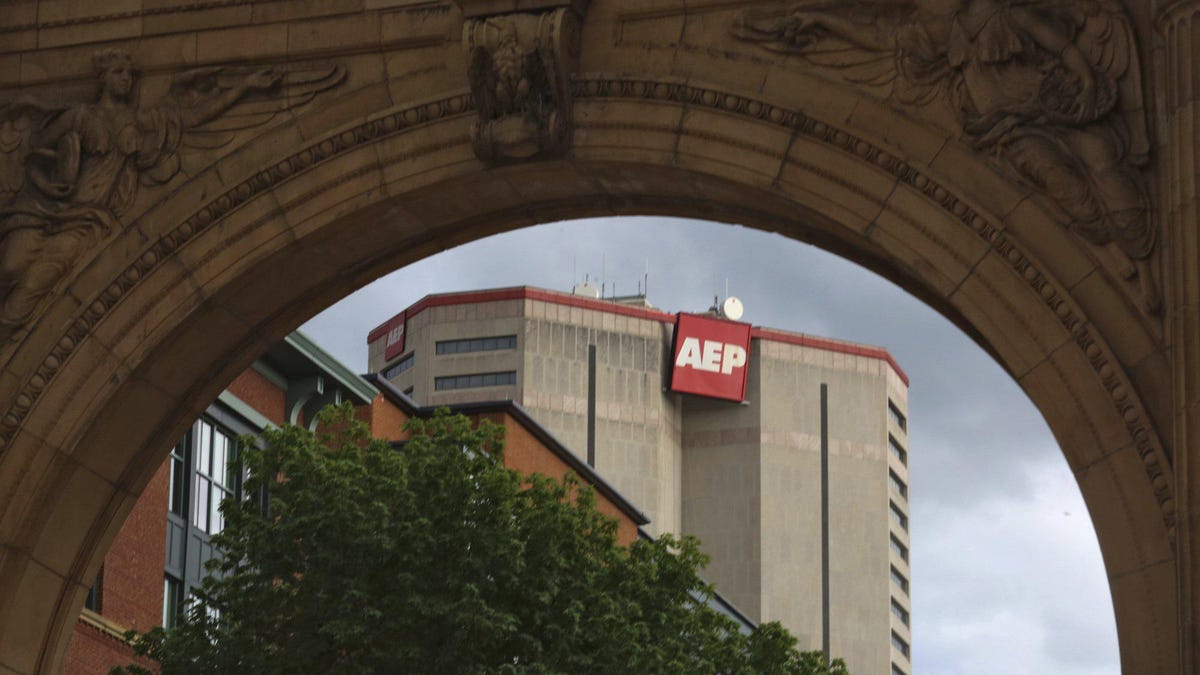World
Q&A: Sebastien Lai on father Jimmy Lai’s Hong Kong ‘show trial’
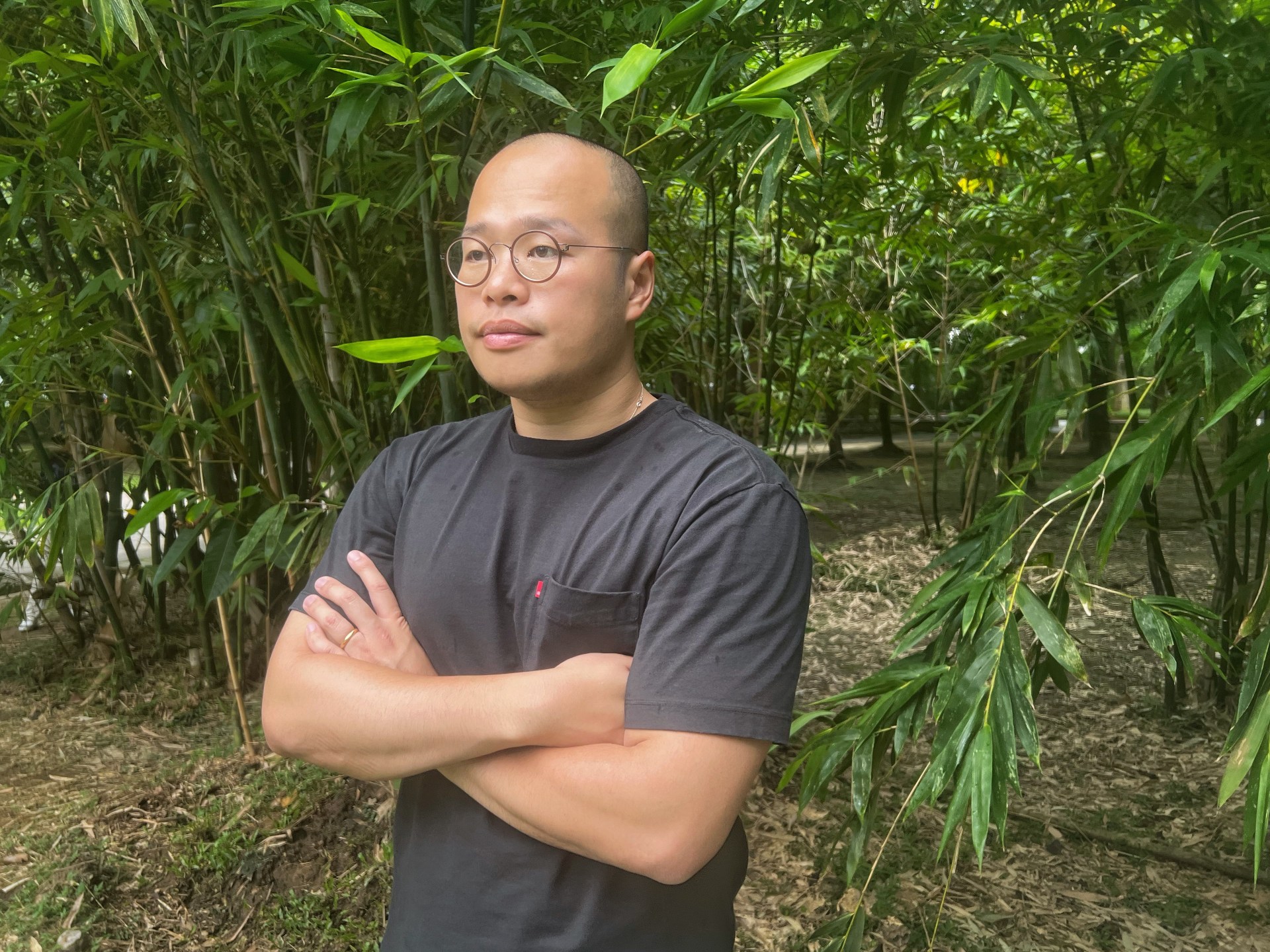
Taipei, Taiwan – The national security trial of Jimmy Lai, the jailed 75-year-old media mogul and founder of the now defunct Apple Daily newspaper, was supposed to start next month.
But it has now been delayed – again – until December 18.
Lai has been in custody since December 2020 and faces multiple charges related to Hong Kong’s democracy movement and protests.
Lai has already been sentenced to more than five and half years over a commercial lease at Apple Daily, and faces additional charges under the national security law (NSL) and sedition law, which dates from colonial times.
Lai was also denied his choice of lawyer – veteran British barrister Timothy Owen – for the NSL trial, which will be heard before a panel of three judges approved by Beijing.
Sebastien Lai, the tycoon’s 28-year-old son spoke to Al Jazeera in Taipei about his father’s situation and his hopes for the future.
Al Jazeera: What are your expectations for the upcoming trial?
Sebastien Lai: I’m optimistic, in a sense. Obviously, this is a show trial. There’s actually no basis for national security convictions. There’s no basis for anything that they can convict on up to now, and he’s been in jail for three years. But my expectation is that it’s an opportunity to see if Hong Kong and the Hong Kong government are people of their word, because at the end of the day, what was happening is very obvious to the free world.
They’re basically punishing a publisher, a 75-year-old man, for standing up for the freedoms that the Hong Kong state has and that were also promised during the handover. That’s all it is really and they’re using a national security law, and the national security law isn’t retroactive. That’s something that they’ve stated very clearly – once it was in place, from that point is what counts. So if we look at it even just on that very level, on their word, then none of these guys should be in jail.
I think there’s a reason why they keep delaying the trial. There’s a belief that if you’re delaying it, it means that you don’t have a very strong case. And also, more importantly, they are really trying to get it under everybody’s radar – that’s why they’re doing it during Christmas. That’s my conclusion on my part, but it makes sense.
Al Jazeera: How do you feel about the government’s decision to block your father’s choice of a British lawyer for his national security trial?
Lai: I have no contact with the Hong Kong legal team. My contact is with the international legal team, and they’re independent of one another. And with the lawyer they provide… it goes to show where the Hong Kong legal system is now. But more importantly, I think it’s just a symptom of a much greater disease, of a much greater decay of the whole legal system.
You can see that in dad getting 12 months for lighting a candle at a Tiananmen Square vigil, how recently he was acquitted for organising a protest that 1.7 million showed up at, but he had already carried out the sentence.
Either way, I think the greater point is he served more than 10 months more than a year (referring to the time his father had already spent in prison) for participating in a protest with 1.7 million people, and on another level 1.7 million went out and protested [against] the government. I think what’s happening with the foreign lawyer is unfortunate but it’s more of a sense of where the Hong Kong legal system is going.
Al Jazeera: What can other countries like the United Kingdom do?
Lai: The UK has a responsibility to its citizens. My father is a citizen… they have a responsibility to their citizens, especially when they are being unjustly treated abroad. And there’s also an element of Hong Kong has essentially broken its promise to the UK about 50 years of handover, so there’s also that. The UK has to hold Hong Kong accountable, or at least call Hong Kong out that they are willing to break the pacts they have with other nations on a whim.
Hong Kong is trying to tell the world that they are open for business and they want to be part of the world again, and it’s important to realise that Hong Kong’s main benefit is it’s a place where it’s very close to China but it had the rule of law and a very free government system. It used to be a model of freedom and Hong Kong is still trying to tell the world that they have that, but they can’t do that if they have someone like my dad in jail. They can’t say they have free press and send 500 people to raid a newspaper. You have to choose one or the other. I don’t think you can treat the world like they’re stupid.
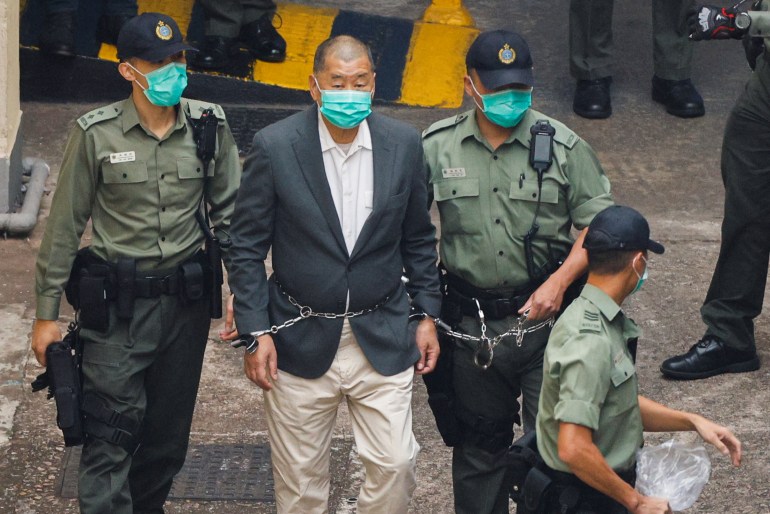
Hong Kong can either show the world that ‘we still want to be a part of the world economy’, ‘we still want to be open for business’ or they can keep doing this folly, which is basically cruel. My father, and the other political prisoners, they’ve already slandered their names and put them in jail. Dad’s been in jail for three years and at 75 that’s a long time. And so I think at this point it’s just cruel.
I hope that the UK puts my dad’s case forward every time they negotiate with Hong Kong, they are vocal about this and tell China and Hong Kong that this is unacceptable behaviour and that it’s not acceptable for China and Hong Kong to step on the freedoms that the UK has, or the free world has.
Al Jazeera: How’s your father doing in prison?
Lai: Unfortunately I haven’t seen him in more than three years since I left in 2020. I recently saw photos of him. I think he’s a strong man and I know that he is mentally tough, I know that obviously knowing you’re doing the right thing is a great source of strength, his religion is a great source of strength, but at his age he is the oldest political prisoner in Hong Kong unless they try to arrest someone else.
Al Jazeera: Are you close with him? People have challenging relationships with their fathers sometimes.
Lai: I was very fortunate, I was incredibly lucky because by the time that I was born, dad was already a bit older. So I’m 28, he’s 75. He was 47 when I was born, so obviously he was still very busy but we got to spend a lot of time together growing up. I think at the end of the day, he’s obviously someone I look up to greatly because of his actions [and] because of his willingness to stand by his word.
I saw videos from the BBC that they showed me from the archives and it was him before the handover. These English guys were interviewing him, and the crazy thing is this is like 30 years ago and when they ask him, ‘What are they going to do? Are they going to come after you?’ And he tears up and says, ‘Hong Kong is my home, it’s given me everything, so I’ll protect it’. And that was 30 years ago. It’s mind-blowing.
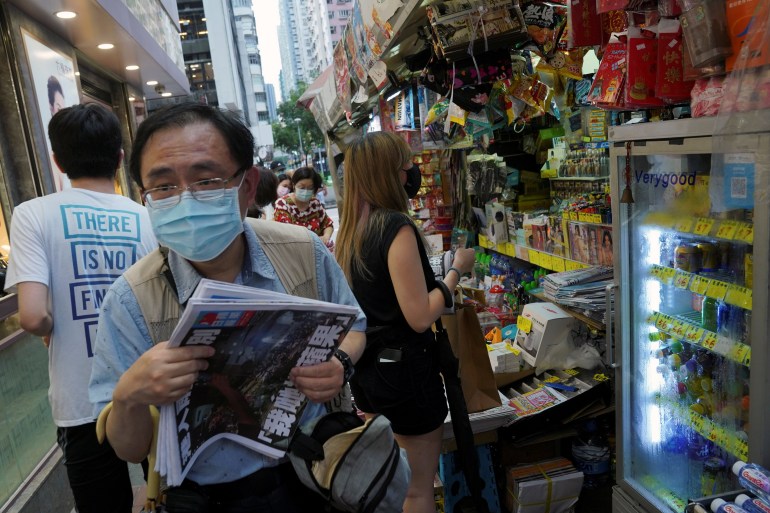
Al Jazeera: How would you describe the Hong Kong of today compared with the one where you grew up?
Lai: I think for a lot of people Hong Kong was always a very hopeful place. It had its issues but it was always a very hopeful place – a place where because of the institutions that were in place … where if someone was willing to work really hard they could have a successful outcome. But I think more importantly, it was one of the rare places in the world – a society of Chinese people that had freedoms besides universal suffrage. It was an experiment in that sense. It was always people leaving mainland China to come to Hong Kong and not Hong Kong to mainland China. So for me that was always a source of pride, the freedoms that we had, the hope that we had it’s what made Hong Kong so dynamic.
My impression of Hong Kong Kong now – and I haven’t been for three years – is that by and large that freedom is gone. It’s a place where the government has blurred the lines of the law so much that most people would rather stay clear of it. I think that element of not being scared of what you say or scared of what you do, I think that’s central to why Hong Kong was successful.
Al Jazeera: Where do you see Hong Kong in five years?
Lai: I think it depends on if the people running Hong Kong realise it’s true that these freedoms are one way to [stand out] because in the end, the government has to be accountable for what they say, they will be judged on their actions. I hope and I don’t know if that will be the case that Hong Kong will realise the cost of giving up these freedoms is too high and reinstate them. If that’s the case there is a possibility of it being a world city again. I think where it’s going though it’s probably going to be another mainland city, and it’s going to lose its competitive advantage, it’s no longer going to be able to compete with other cities in mainland China.

World
OpenAI unveils new AI model as competition heats up

World
Zionism explained from its biblical origins to the rebirth of the state of Israel
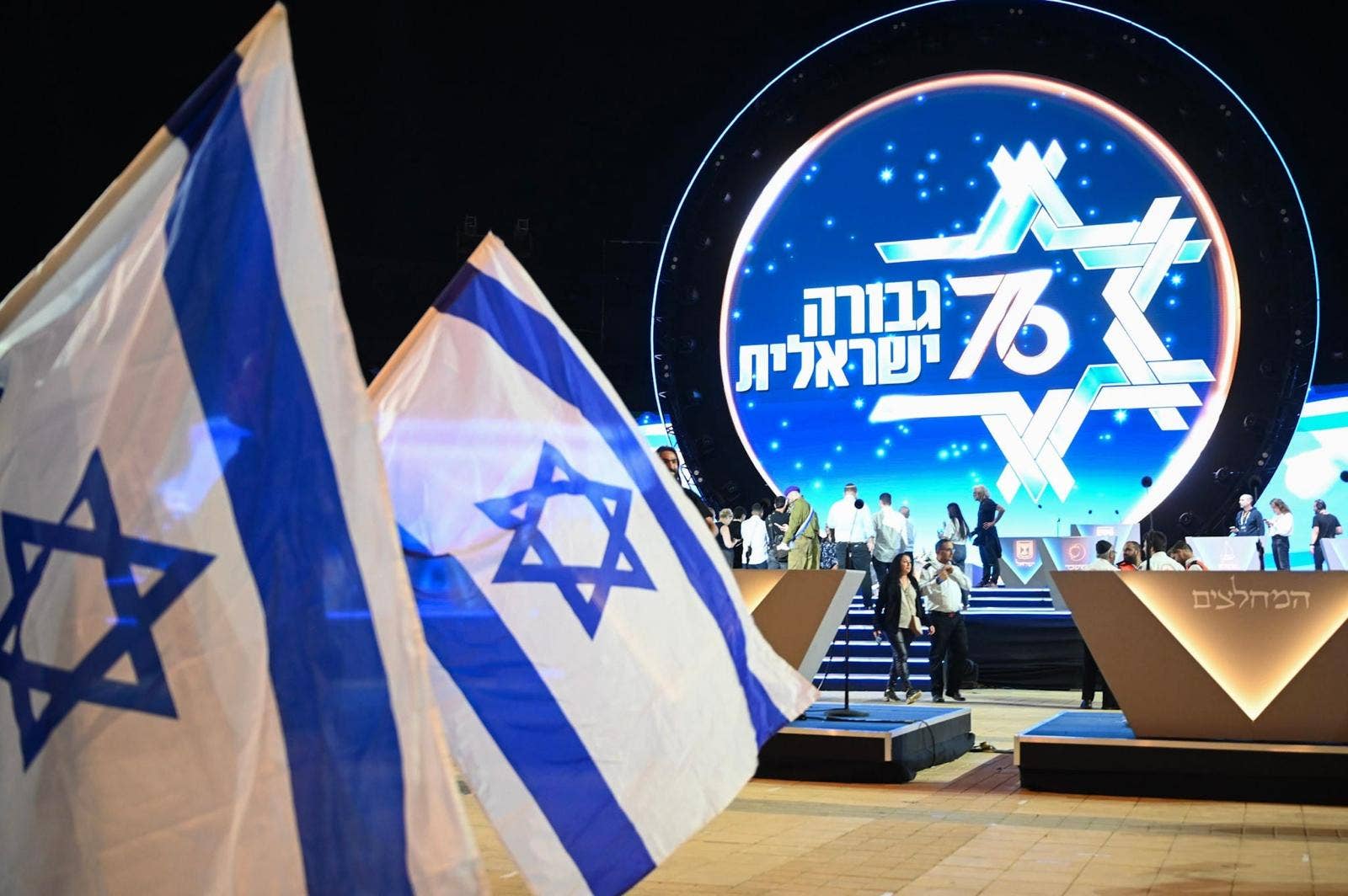
JERUSALEM – As Israelis mark the rebirth of their nation 76 years after the country’s first prime minister, David Ben-Gurion, declared the modern founding of Israel in 1948, opponents of the Jewish state (anti-Zionists) seek its destruction.
Fanatic anti-Israel activists and antisemites, particularly on American college campuses, have launched a campaign to strip Jews of their national homeland, the state of Israel, and turn the Mideast’s only democracy into a pariah state, often using anti-Zionist tropes in their chants and on their banners.
To many watching today’s protests against Israel, Zionism might have developed a negative connotation, but both biblically and politically, some say it’s a philosophy of action. Theodor Herzl, the founder of modern Zionism, famously wrote over 100 years ago about the creation of a new Jewish state: “If you will it, it is no dream.”
Fox News Digital spoke to experts about the mixture of biblical passages and modern philosophy – Zionism – that laid the religious and intellectual foundation for the re-establishment of Israel.
CAMPUS CHAOS AND ANTI-ISRAEL RHETORIC REVEAL STARK FAILURES OF TODAY’S HIGHER EDUCATION
Israeli Prime Minister David Ben Gurion reads the Jewish “Declaration of Independence” in Tel Aviv on May 14, 1948. (Getty Images)
Herzl, an Austrian-Hungarian Jewish journalist, wrote about the First Zionist Congress, in Switzerland in 1897, “At Basel I founded the Jewish State. If I said this out loud today, I would be answered by universal laughter. Perhaps in five years, and certainly in 50, everyone will know it.”
“…I will firmly plant them in their own land, never again to be uprooted from the land that I have given them, says the Lord your God.”
Herzl’s prescient vision about the Jewish state became a concrete reality.
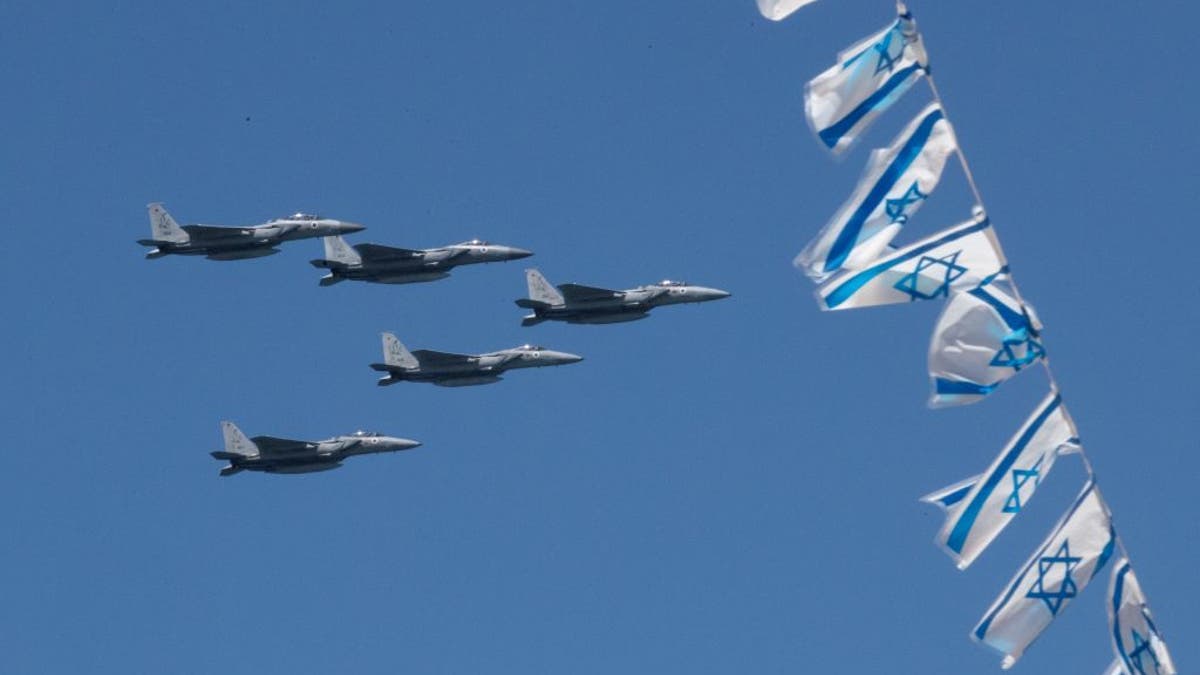
Fighter jets perform during an air show celebrating Israel’s Independence Day in Tel Aviv, Israel, on April 26, 2023 (Chen Junqing/Xinhua via Getty Images)
BIBLICAL ORIGINS
Ze’ev Orenstein, the director of international affairs for the City of David Foundation in Jerusalem, explained its religious importance. “Zionism not only represents the return of the Jewish people as sovereign to their ancestral homeland – the Land of Israel – where we have had a continuous presence dating back some 3,500 years to the time of the Biblical Joshua until today.”
SURVIVOR OF HAMAS TERROR ATTACK ON ISRAEL RECOUNTS PAIN, GRIEF OF LOSING ‘ANGEL’ BOYFRIEND ON OCT. 7
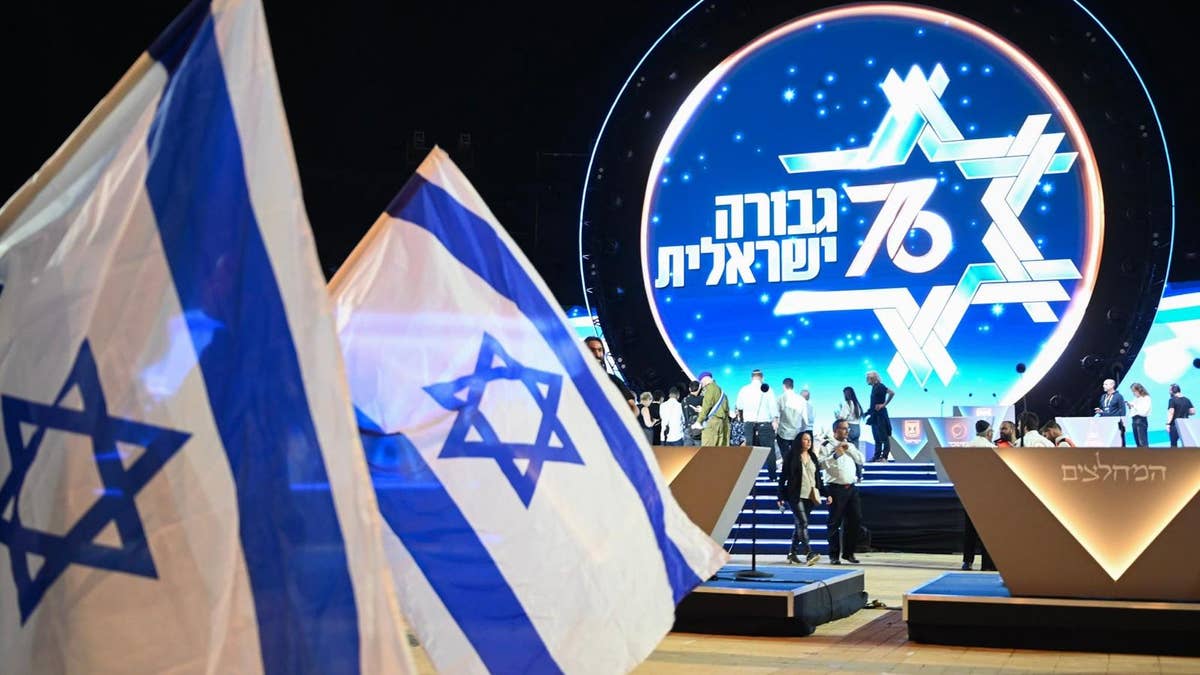
The major state ceremony for Israel’s Independence Day takes place at Mount Herzl in Jerusalem. (Yoav Dudkevitch/TPS-IL)
“A land where the Jewish people are worshiping the same God, practicing the same faith, walking upon the very same hills and valleys, speaking the same language and keeping the same traditions and festivals as our ancestors did millennia ago,” he said.
Orenstein cited a biblical passage from Amos 9: 14-15 that grounds the creation of the Jewish state in the Holy land: “I will restore My people Israel from captivity; they will rebuild and inhabit the ruined cities. They will plant vineyards and drink their wine; they will make gardens and eat their fruit. I will firmly plant them in their own land, never again to be uprooted from the land that I have given them, says the Lord your God.”
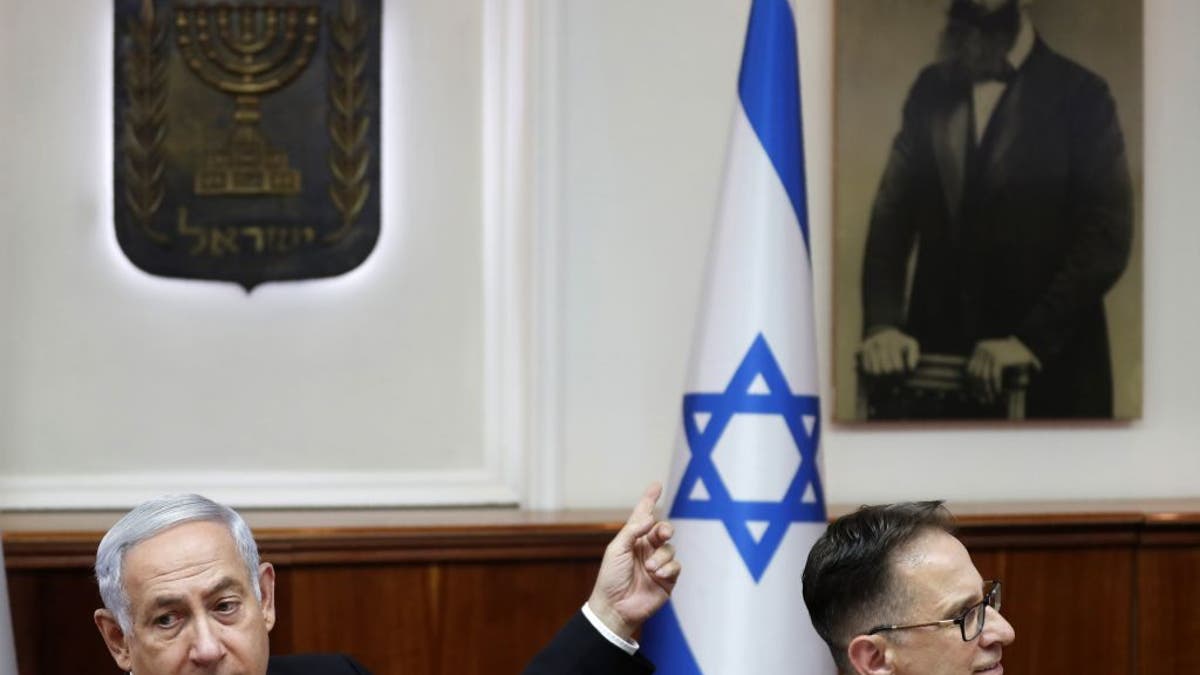
Israeli Prime Minister Benjamin Netanyahu points at a portrait of Theodor Herzl, founder of Zionism, as he attends a weekly cabinet meeting in Jerusalem June 2, 2019. (Photo by RONEN ZVULUN/POOL/AFP via Getty Images) (Photo by RONEN ZVULUN/POOL/AFP via Getty Images)
Orenstein noted the transition from the Bible to the modern solidification of Israel as a state “also represents the return of the Jewish people to being masters of our own fate and destiny – only fully possible as sovereign in our homeland – striving to build a society which will serve as a source of light, inspiration and blessing – not only to Israel and the Jewish people, but to all the peoples of the region and to the entire world.”
‘Anti-Zionism’ is a transparent rebranding of antisemitism.”
MOTHER OF AMERICAN-ISRAELI HOSTAGE TAKEN ON OCT. 7 SAYS HER FAITH HELPS HER THROUGH HER DARKEST DEPTHS OF PAIN
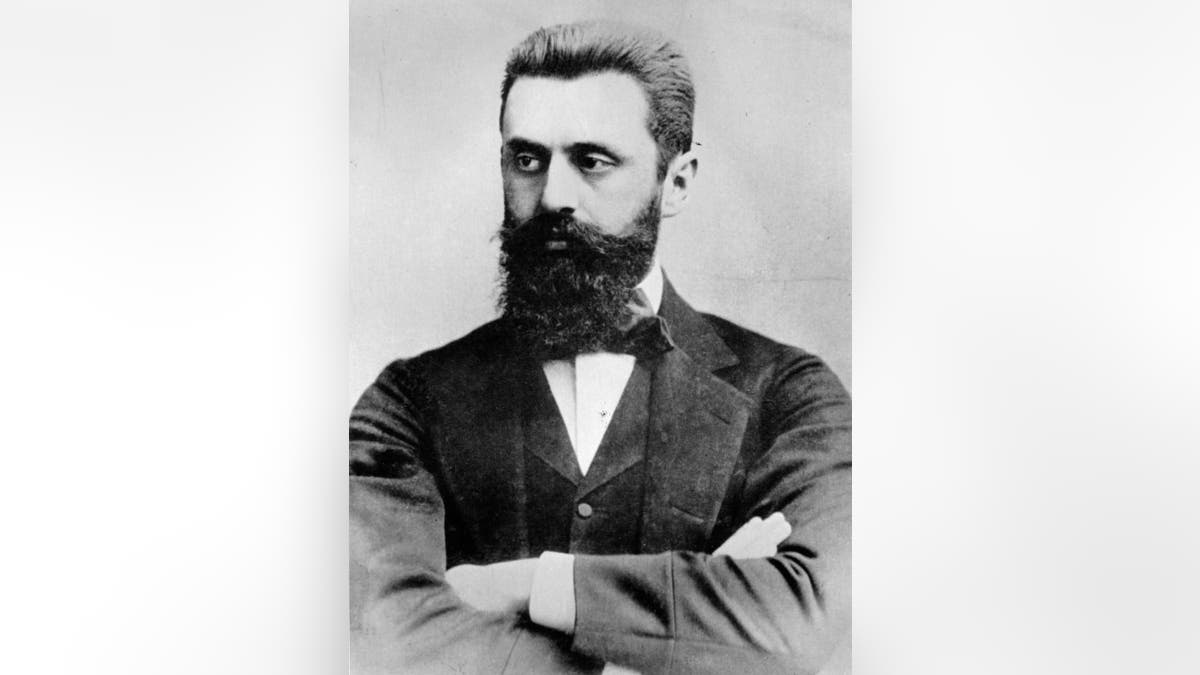
Writer and statesman Theodor Herzl (1860-1904), is the founder of national Zionism and the World Zionist Organization. (Jewish Chronicle/Heritage Images/Getty Images)
He added, “The return of the Jewish people to Israel as sovereign after 2,000 years of exile, serves as an eternal reminder to individuals and nations alike that what was need not be. Despite seemingly insurmountable odds, and with equal measures of unwavering determination and unbreakable faith, good will ultimately triumph.”
Anti-Zionists continue to denigrate both Herzl’s founding philosophy of the modern Jewish state, Zionism, and the Biblical foundation of the state of Israel. The U.N. also played a key role in stoking antisemitism and anti-Israel hatred, argue its critics.
In 1975, a majority of U.N. member states, spearheaded by the Soviets and Arab dictatorships, passed a resolution equating Zionism with racism. After the collapse of the communist Soviet Union and its allies in Eastern Europe, member states overturned the antisemitic resolution in 1991.
INCREASING ANTISEMITISM
Eugene Kontorovich, an Israeli legal scholar, told Fox News Digital, “Opposition to Zionism means that Jews, having achieved national independence, are not entitled to keep it. There is no similar global opposition to any other people’s statehood, which makes it hard to separate ‘anti-Zionism’ from the millennia of antisemitism that faced Jews before they had a state. Indeed, with the plurality of the world’s Jews living in Israel and almost all of the rest strongly attached to it, ‘anti-Zionism’ is a transparent rebranding of antisemitism.”
‘DEATH TO AMERICA’ RAPIDLY EMERGING AS KEY SLOGAN OF ANTI-ISRAEL AGITATORS IN US
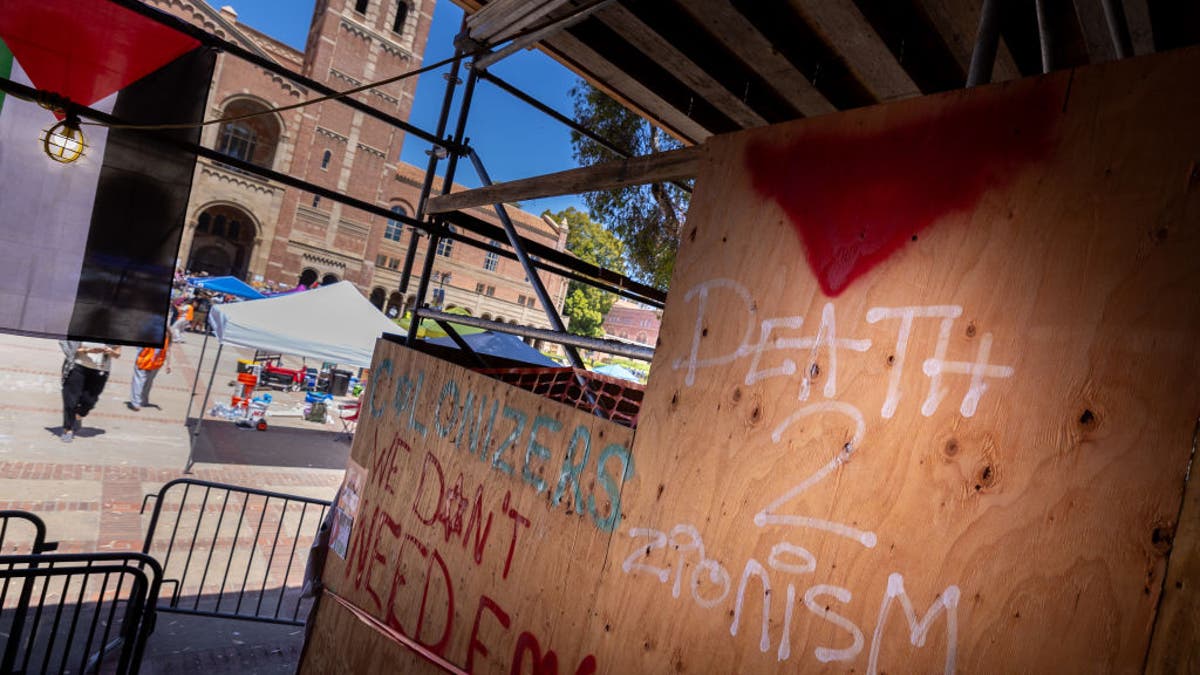
“Death to Zionism” graffiti at the Powell Library on the UCLA campus, where anti-Israel agitators erected an encampment on April 29, 2024, in Los Angeles. (Brian van der Brug/Los Angeles Times via Getty Images)
Kontorovich noted, “Zionism is the national independence movement of the Jewish people. For 2,000 cruel years, the Jewish people did not have a home, and was at the mercy of the nations and empires they found themselves in – a minority everywhere.”
He added, “Supporting Zionism means that just as the Irish have Ireland, the Ukrainians have Ukraine, and Japanese have Japan, Jews should have an independent state in their ancestral homeland. Many ethnic groups are majorities in numerous states, like Arabs, which have over 20 countries that identify themselves as Arab. Zionism does not insist that Jews, have two states – say one for Azshkenazi Jews, and one for Sephardim. Just one. “
Azshkenazi Jews have their modern roots in Eastern and Central Europe, while Sephardic Jews have their origins in Portugal and Spain and later fled to North Africa and Turkey.
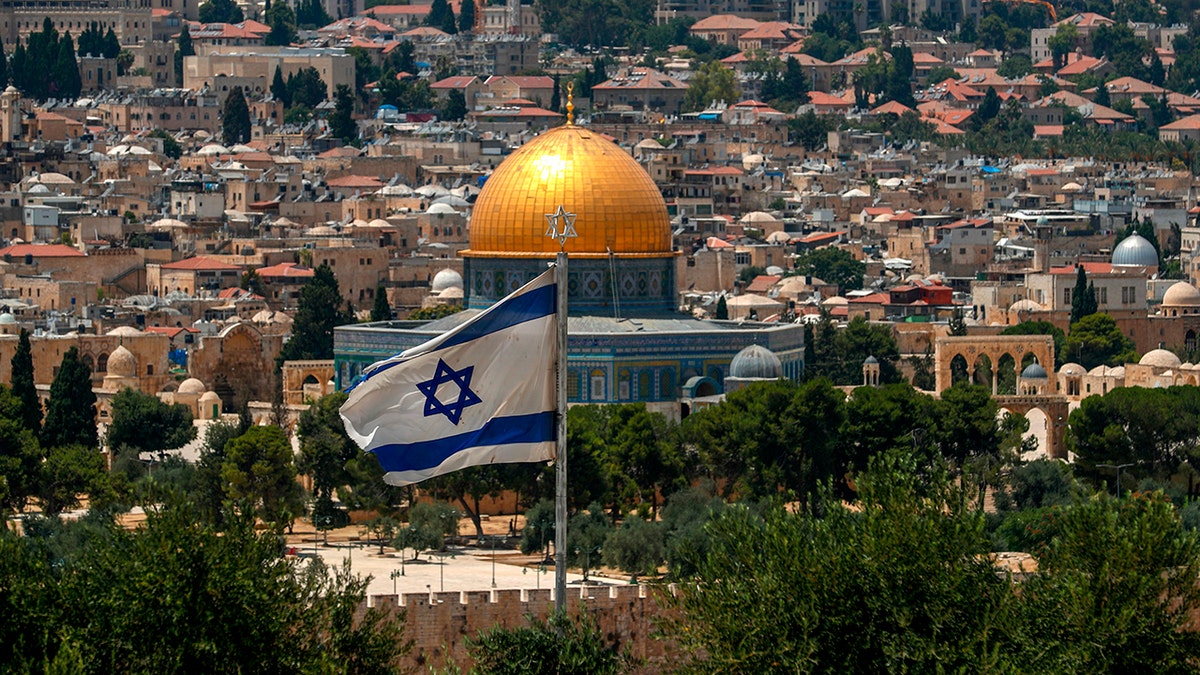
An Israeli flag flies in Jerusalem, with the Temple Mount and the Dome of the Rock in the background, on July 30, 2020. (Ahmad Gharabli/AFP via Getty Images)
For many Jews, the yearning of a return to their Biblical homeland is also captured by the famous Psalm 126:
“A song of ascents. When the Lord restored the captives of Zion, we were like dreamers. Then our mouths were filled with laughter, our tongues with shouts of joy. Then it was said among the nations, The Lord has done great things for them. The Lord has done great things for us and we are filled with joy.”
World
Pro-Palestinian university students in the Netherlands uphold protest

On Monday, students and faculty members from multiple universities in the Netherlands protested, voicing their opposition to Israel’s military operations in the Gaza Strip.
In the capital, demonstrators entered the University of Amsterdam building, set up tents, and built barricades using office furniture.
The University reported trespassing and vandalism and requested police intervention.
The mayor of Amsterdam, the police chief, and the public prosecutor decided to deploy riot police to break up the campus protest and restore order, a spokesperson for the mayor told Dutch media.
It is unclear how many protesters were arrested.
Similar protests also took place across Dutch university in Groningen, Nijmegen, Utrecht, Wageningen and Leiden.
Student protests have been gaining momentum across Europe, following similar actions in the US universities where several encampments have spread out.
The war started after the Palestinian militant groups attacked the southern of Israel, killing 1,200 people in a surprise attack and taking around 250 hostage.
Israel’s’ retaliatory military operation has killed more than 34,700 Palestinians, according to local health officials, and has devastated the Gaza Strip.
-

 Politics1 week ago
Politics1 week agoHouse Dems seeking re-election seemingly reverse course, call on Biden to 'bring order to the southern border'
-

 Movie Reviews1 week ago
Movie Reviews1 week agoExhuma Movie Review: An effective horror film steeped in myth, legends, and realism
-

 World1 week ago
World1 week ago‘It’s going to be worse’: Brazil braces for more pain amid record flooding
-

 Politics1 week ago
Politics1 week ago'Stop the invasion': Migrant flights in battleground state ignite bipartisan backlash from lawmakers
-

 World1 week ago
World1 week agoGerman socialist candidate attacked before EU elections
-

 World1 week ago
World1 week agoSpain and Argentina trade jibes in row before visit by President Milei
-

 Politics1 week ago
Politics1 week agoRepublicans believe college campus chaos works in their favor
-

 News1 week ago
News1 week agoUS man diagnosed with brain damage after allegedly being pushed into lake




